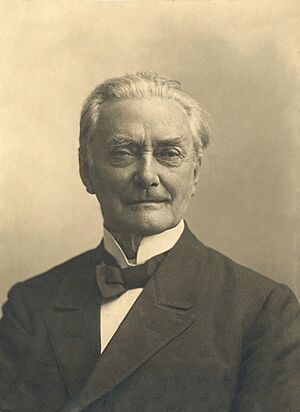August Bielenstein facts for kids
Quick facts for kids
August Bielenstein
|
|
|---|---|
 |
|
| Born |
August Johann Gottfried Bielenstein
4 March [O.S. 20 February] 1826 |
| Died | 6 July [O.S. 23 June] 1907 |
| Nationality | Baltic German |
| Occupation | Pastor linguist ethnographer |
| Spouse(s) | Ernestine Louise Hermine Erna von Bordelius |
August Johann Gottfried Bielenstein (Latvian: Augusts Johans Gotfrīds Bīlenšteins; born March 4, 1826 – died July 6, 1907) was a very important Baltic German person. He was a pastor (a religious leader), a linguist (someone who studies languages), a folklorist (someone who collects traditional stories and customs), and an ethnographer (someone who studies different cultures). He also studied theology, which is the study of religious beliefs.
August Bielenstein was born in Mitau (Jelgava), which is now in Latvia. He also passed away in the same city. His father, Johann Gottfried Bielenstein, was also a Lutheran pastor and a teacher. August spent his childhood in a place called Jaunauce parish.
Contents
Early Life and Studies
As a young man, August Bielenstein traveled to Germany. He studied at a high school (gymnasium) in Saxony. Later, he went to the University of Halle. Many important pastors from the Baltic region studied there.
In 1850, he earned a special degree in theology from the University of Dorpat. Years later, in 1883, he received an honorary doctorate from the University of Königsberg. After his father died, August took over his father's duties as a pastor in Jaunauce parish.
Life as a Pastor in Dobele
In 1867, August Bielenstein became a pastor in Dobele. He lived and worked there until 1905. One of his big projects was overseeing a new edition of the Bible in the Latvian language in 1877.
During a time of unrest in 1905, his home in Dobele was attacked. His valuable library and important papers were sadly burned. After this event, Bielenstein decided to leave his job in Dobele. He spent his last years back in his hometown of Mitau (Jelgava).
Contributions to Latvian Culture
August Bielenstein was the editor of a major Latvian language newspaper called Latviešu Avīzes. He was also a member of the St. Petersburg Academy of Sciences. He wrote many important books about language and culture.
Some of his famous works include:
- Die lettische Sprache, nach ihren Lauten und Formen (The Latvian Language, Its Sounds and Forms), published in two parts in 1863–64.
- Die Grenzen des lettischen Volksstammes und der lettischen Sprache in der Gegenwart und im 13. Jahrhundert (The Borders of the Latvian Tribes and the Latvian Language Today and in the 13th Century), published in 1892.
He strongly encouraged people to collect dainas, which are traditional Latvian folk songs. He also studied old wooden buildings and examined ancient castle mounds. He tried to match these mounds with descriptions from old historical records.
While he helped a lot with studying the Latvian language and culture, he also had different views from the Young Latvians. He strongly supported the traditions of the Baltic Germans. His friendship with Wilhelm Mannhardt made him interested in Latvian mythology and how people thought in the past.
From 1864 to 1895, he was the president, and later an honorary president, of the Latvian Literary Society. In 1893, he became an honorary member of the Riga Latvian Society.
Family
August Bielenstein married Ernestine Louise Hermine Van Bordelius. They had nine children together, and six of them lived to adulthood. Two of his sons also became pastors.
One of his sons was a famous architect named Bernhard Bielenstein. His daughter, Martha Beilenstein, created an important map book called the Atlas of the Ethnological Geography of Modern and Prehistoric Latvia. This atlas showed the cultural geography of Latvia.
See also
- Latvian Literary Society
- List of Baltic German scientists
 | Leon Lynch |
 | Milton P. Webster |
 | Ferdinand Smith |

